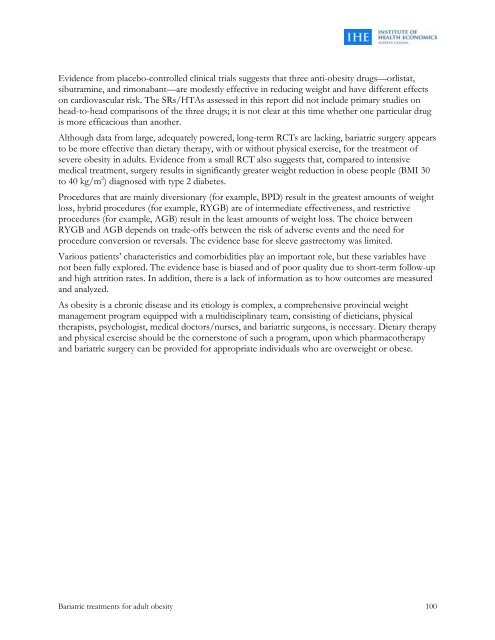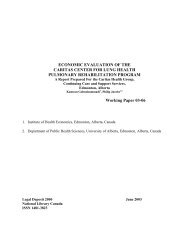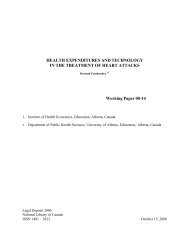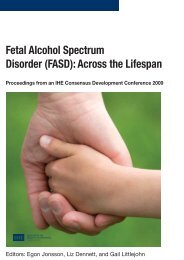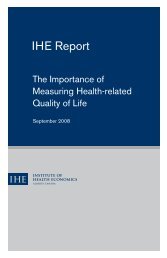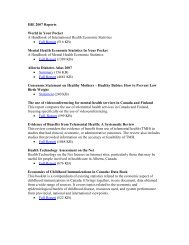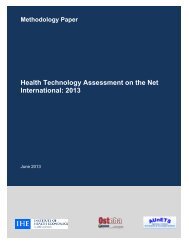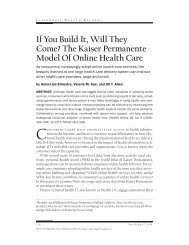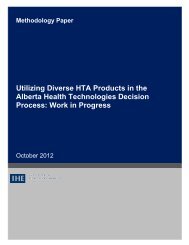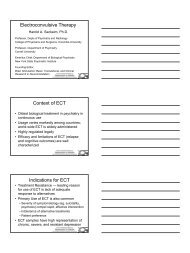Bariatric treatments for adult obesity - Institute of Health Economics
Bariatric treatments for adult obesity - Institute of Health Economics
Bariatric treatments for adult obesity - Institute of Health Economics
- No tags were found...
Create successful ePaper yourself
Turn your PDF publications into a flip-book with our unique Google optimized e-Paper software.
Evidence from placebo-controlled clinical trials suggests that three anti-<strong>obesity</strong> drugs—orlistat,sibutramine, and rimonabant—are modestly effective in reducing weight and have different effectson cardiovascular risk. The SRs/HTAs assessed in this report did not include primary studies onhead-to-head comparisons <strong>of</strong> the three drugs; it is not clear at this time whether one particular drugis more efficacious than another.Although data from large, adequately powered, long-term RCTs are lacking, bariatric surgery appearsto be more effective than dietary therapy, with or without physical exercise, <strong>for</strong> the treatment <strong>of</strong>severe <strong>obesity</strong> in <strong>adult</strong>s. Evidence from a small RCT also suggests that, compared to intensivemedical treatment, surgery results in significantly greater weight reduction in obese people (BMI 30to 40 kg/m 2 ) diagnosed with type 2 diabetes.Procedures that are mainly diversionary (<strong>for</strong> example, BPD) result in the greatest amounts <strong>of</strong> weightloss, hybrid procedures (<strong>for</strong> example, RYGB) are <strong>of</strong> intermediate effectiveness, and restrictiveprocedures (<strong>for</strong> example, AGB) result in the least amounts <strong>of</strong> weight loss. The choice betweenRYGB and AGB depends on trade-<strong>of</strong>fs between the risk <strong>of</strong> adverse events and the need <strong>for</strong>procedure conversion or reversals. The evidence base <strong>for</strong> sleeve gastrectomy was limited.Various patients’ characteristics and comorbidities play an important role, but these variables havenot been fully explored. The evidence base is biased and <strong>of</strong> poor quality due to short-term follow-upand high attrition rates. In addition, there is a lack <strong>of</strong> in<strong>for</strong>mation as to how outcomes are measuredand analyzed.As <strong>obesity</strong> is a chronic disease and its etiology is complex, a comprehensive provincial weightmanagement program equipped with a multidisciplinary team, consisting <strong>of</strong> dieticians, physicaltherapists, psychologist, medical doctors/nurses, and bariatric surgeons, is necessary. Dietary therapyand physical exercise should be the cornerstone <strong>of</strong> such a program, upon which pharmacotherapyand bariatric surgery can be provided <strong>for</strong> appropriate individuals who are overweight or obese.<strong>Bariatric</strong> <strong>treatments</strong> <strong>for</strong> <strong>adult</strong> <strong>obesity</strong> 100


